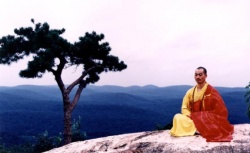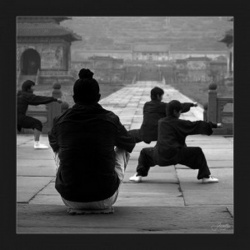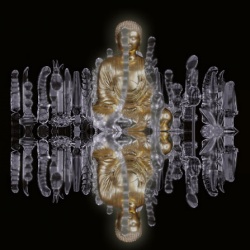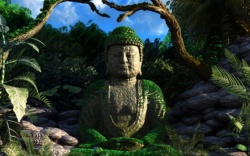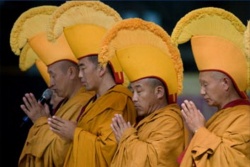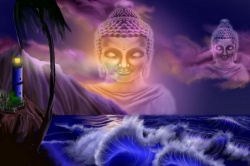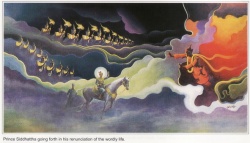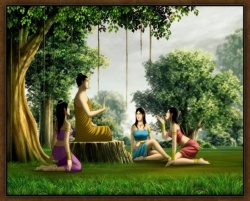Devadatta
Devadatta (Sanskrit and Pali: देवदत्त devadatta; Sinhalese: දේවදත්ත;) was by tradition a Buddhist monk, cousin and brother-in-law of Gautama Siddārtha, the Śākyamuni Buddha, and brother of Ānanda, a principal student of
The Buddha. Devadatta was a Koliyan and is said to have parted from The Buddha's following with 500 other Monks to Form their own Sangha, most of whom are said to have been Shakya clan relatives of both Devadatta and Siddhartha.
Devadatta
提婆達多 (Skt, Pali; Jpn Daibadatta)
A cousin of Shakyamuni who, after Shakyamuni's Enlightenment, first followed him as a Disciple but later became his enemy. Devadatta was a younger brother of Ananda (an elder brother according to another account). His father was Dronodana (or Amritodana). In Buddhist scriptures, he is described as a man of utmost Evil who tried to kill Shakyamuni Buddha and disrupt his Order. When both were young, before Shakyamuni embarked on a religious Life, Devadatta is said to have beaten to
Death a white elephant that had been given to him by Shakyamuni. Devadatta was also a rival for the hand of Yashodhara, whom Shakyamuni eventually married. Later Devadatta renounced secular Life and became one of Shakyamuni's disciples.In his Arrogance, however, he grew jealous of Shakyamuni and sought to usurp The Buddha's position. He fomented
a schism in the Buddhist Order, luring away a number of Monks. He also goaded Ajatashatru, prince of Magadha, into overthrowing his father, Bimbisara, a patron of Shakyamuni, and ascending the throne in his stead. With the new king supporting him, Devadatta made several attempts on Shakyamuni's Life and caused a schism in
his Order. As a result of his misdeeds, Devadatta is said to have fallen into Hell alive. In the "Devadatta" (twelfth) chapter of the Lotus Sutra, however, Shakyamuni reveals that in some past existence he himself had learned the Lotus Sutra from a seer named Asita, and that this seer was Devadatta. He also predicts that Devadatta will attain
Enlightenment in the future as a Buddha named Heavenly King. Nichiren (1222-1282) takes this prediction to illustrate the principle that even Evil persons have the potential for Enlightenment.
The name Devadatta has the meaning God-given in Palī and Sanskrit. It is composed from the genitive of Deva and the past participle datta of the verb da, give. In the Bhagavad Gītā, the Conch shell used by Arjuna on the battle-field of Kurukshetra was named Devadatta. The name Devadatta is still given today, and is often spelled Deodatta.
==Scholarship==
===Mahāsāṃghika Vinaya research===
According to Andrew Skilton, modern scholarship generally agrees that the Mahāsāṃghika Vinaya is the oldest extant Buddhist Vinaya. The Mahāsāṃghika Vinaya is significant for its differing accounts from those of other schools. The Mahāsāṃghika Vinaya mentions the figure of Devadatta, but the description and attributes of this figure are entirely
different from those in the vinayas of sects from the Sthavira branch. In fact, there is no overlap in the characterizations of Devadatta between the Mahāsāṃghika Vinaya and the other five extant vinayas which all come from the Sthavira branch. This has led some scholars to conclude that the story of Devadatta was a legend produced by the Sthaviras after they split from the
Mahāsāṃghikas in the 4th century BCE. André Bareau has discovered that the earliest Vinaya material common to all sects simply depicts Devadatta as a Buddhist saint who wishes for the Monks to live a rigorous lifestyle.
===Records from Chinese pilgrims to India===
Faxian and other Chinese pilgrims who travelled to India in the early centuries of the current era recorded the continued existence of "Gotamaka" buddhists, followers of Devadatta. Gotamaka are also referred to in Pali texts of the second and fifth centuries of the current era. The followers of Devadatta are recorded to have honored all the Buddhas
previous to Śākyamuni, but not Śākyamuni. According to Faxian, Xuanzang and Yijing's writings, some people practised in a similar way and with the same Books as common Buddhists, but followed the similar tapas and performed Rituals to the past three Buddhas and not Śākyamuni Buddha. Many followers of that sect listened to the lessons in the Nālandā with the others, but it is believed by many that they were not students of Devadatta. However, there are still those who say they follow Devadatta today at Bodh Gaya.
==Theravāda portrayals of Devadatta==
===Devadatta in the Theravāda Vinaya===
In Cullavagga section VII of the Vinayapiṭaka of the Theravādins which deals with schisms it is told how Devadatta went forth along with a number of The Buddha’s other relatives and clansmen. In the first year he attained psychic Power, but made no supermundane achievement.
Looking round to see whom he could convince to honour him he decided to approach Prince Ajātasattu, the heir to the Magadhan throne. Having psychic Power he assumed the Form of a young boy clad in snakes and sat in the Prince’s lap, which very much impressed the prince, who became his Disciple.
Ajātasattu began to send great offerings to Devadatta, and the latter became obsessed with his own worth, and began to have thoughts that it was he who should lead The Sangha, not The Buddha, and he didn’t desist even though this Thought brought down his psychic powers.
When told about the offerings that Devadatta was receiving The Buddha remarked that all these gains were only going towards his destruction, just as a plantain or a bamboo is destroyed by its fruit.
Shortly thereafter Devadatta asked The Buddha to retire and let him take over the running of The Sangha. The Buddha retorted that he did not even let his trusted disciples Sāriputta or Moggallāna run The Sangha, much less one like him, who should be vomited like spittle, and he gave a special act of publicity about him, warning the Monks that he had changed for the worse.
Seeing the danger in this Devadatta approached Prince Ajātasattu and encouraged him to kill his Father, the good King Bimbisāra, and meanwhile he would kill The Buddha. The King found out about his plan and gave over the Kingdom into the Prince’s control.
Ajātasattu then gave mercenaries to Devadatta who ordered them to kill The Buddha, and in an elaborate plan to cover his tracks he ordered other men to kill the killers, and more to kill them and so on, but when they approached The Buddha they were unable to carry out their orders, and were converted instead.
Devadatta then tried to kill The Buddha himself by throwing a rock at him from on high, while The Buddha was walking on the slopes of a mountain. As this also failed he decided to have the elephant Nāḷāgiri intoxicated and let him loose on The Buddha while he was on almsround. However, the Power of The Buddha’s Loving-kindness overcame the elephant.
Devadatta then decided to create a schism in the order, and collected a few Monk friends, and demanded that The Buddha accede to the following rules for the Monks: they should dwell all their lives in the forest, live entirely on alms obtained by begging, wear only robes made of discarded rags, dwell at the foot of a tree and abstain completely from fish and flesh.
The Buddha refused to make any of these compulsory, however, and Devadatta went round blaming him, saying that he was living in abundance and luxury. Devadatta then decided to create a schism and recite the training rules (Pātimokkha) apart from The Buddha and his followers, with 500 newly ordained Monks.
The Buddha sent his two Chief Disciples Sāriputta and Moggallāna to bring back the erring young Monks. Devadatta Thought they had come to join his Sangha, and asking Sāriputta to give a talk, fell asleep. Then the Chief Disciples persuaded the young Monks to return to The Buddha.
The Buddha praised the Chief Disciples and blamed Devadatta saying that he was doomed to the Niraya Hell for his deeds, and it is reported that shortly thereafter he did in fact fall into Hell.
===Theravāda account===
According to the Pāli Canon, he taught his Sangha to adopt five tapas (literally, austerities) throughout their lives:
- that Monks should dwell all their lives in the forest,
- that they should accept no invitations to meals, but live entirely on alms obtained by begging,
- that they should wear only robes made of discarded rags and accept no robes from the laity,
- that they should dwell at the foot of a tree and not under a roof,
- that they should abstain completely from fish and flesh.
The Buddha allowed the monastics to follow all of these except the last if they so wished, but refused to make them compulsory. They are among the 13 Ascetic practices Dhutanga.
His followers (including Bhikkhus and bhikkhunis) were new Monks from the Vajjī clan. His closest four companions did not come back to The Buddha.
==Mahāyāna portrayals of Devadatta==
===Lotus Sūtra===
In the Lotus Sūtra, chapter 12, found in the Mahāyāna Buddhist tradition, The Buddha teaches that in a past Life, Devadatta was his holy teacher who set him on the Path, and makes a noteworthy statement about how even Devadatta will in time become a Buddha:
"The Buddha said to his Monks: "The king at that time was I myself, and this seer was the man who is now Devadatta. All because Devadatta was a good friend to me, I was able to become fully endowed with this six paramitas, pity, Compassion, Joy, and indifference, with the thirty-two features, the eighty characteristics, the purple-tinged
golden color, the ten powers, the four kinds of fearlessness, the four methods of winning people, the eighteen unshared properties, and the transcendental powers and the Power of the way. The fact that I have attained impartial and correct Enlightenment and can save living beings on a broad scale is all due to Devadatta who was a good friend."
===Amitāyurdhyāna Sūtra===
In the Mahayana Buddhist text, the Amitāyurdhyāna Sūtra, Devadatta is said to have convinced Prince Ajātasattu to murder his father King Bimbisāra and ascend the throne. Ajātasattu follows the advice, and this action (another Anantarika-kamma for killing your own father) prevents him from attaining stream-entry at a later time, when listening to some teaching of The Buddha. This is confirmed by the Sāmaññaphalasutta of the Dīgha Nikāya (DN 2).
Devadatta, who was the son of King Suppabuddha and Queen Pamita, was the cousin of Prince Siddhattha and brother of Princess Yasodhara. He was a playmate of Prince Siddhattha but from a young age displayed signs of cruelty towards animals and jealousy towards the Prince.
As a young prince, Siddhattha had always been everyone’s favourite. He was obedient, kind and considerate. He also excelled in every skill and sport. Devadatta looked on, his heart filled with envy. Why was it that everyone obeyed Siddhattha and listened to Him? Why was He always singled out as the best? Could they not see how great he, Devadatta, was? His mean spirit could not understand that it was his own arrogance, cruel nature, and lack of consideration that turned people away from him.
When Siddhattha became the Buddha, Devadatta watched as Sakyan princes and princesses embraced His Doctrine. He, too, decided to give up his life as a prince and follow the Buddha’s teaching. He entered the order together with his cousins, Ananda and Anuruddha. For a brief period his jealousy and envy were buried as he explored the new teachings with interest. Before long, he reached the first stage of Jhana by developing his keen mind through meditation. Sariputta, seeing his effort and progress, praised him for his diligence.
However, it was only a temporary reprieve. His old anger and envy poured back into his dark heart. Gripped with hatred and jealousy upon seeing the popularity and veneration the Buddha received, he began to form a plot. Seeking the help of King Ajatasattu, a cruel and greedy king, he planned the murder of the Buddha.
At the first attempt to kill the Buddha, Devadatta’s plan was foiled. The large rock he rolled down the mountain at Gijjhakuta bounced off another rock. A sliver detached and struck the sacred foot of the Buddha. The wound was deep and painful but not fatal. Devadatta plotted again. Feeding alcohol to the enraged king elephant Nalagiri, he let it loose on the path towards the Buddha. But the Buddha with His grace calmed the enraged elephant. Unable to bear his defeat, Devadatta sought to cause disharmony among the monks. He requested that the Buddha change the rules for the monks to include the following:
1. Monks should only live in the forest (as opposed to living in monasteries)
2. Monks should only eat food that they received through begging (as opposed to food eaten on invitation by laymen)
3. Monks should only wear robes that were made from cloths that were used to wrap dead bodies - pansukula (as opposed to robes given as gifts by laymen)
4. Monks should live at the foot of trees (as opposed to living in caves in forests)
5. Monks should not eat fish or meat
The compassionate Buddha, who saw that the above rules would cause unnecessary hardship to His monks while not adding any value to their reaching of enlightenment, refused. Instead, He said that any monk who wished to do so could adopt the
above practice of austerities. This caused disharmony among the Sangha as some inexperienced monks, thinking that the only way to enlightenment was by the practice of austerities, left the Buddha and joined an order founded by Devadatta. With the start of these evil actions Devadatta lost the psychic powers and Jhana that he had developed.
To understand fully the deep envy and hatred that Devadatta had towards the Buddha, we must look back in history to their first encounter. In the Seri Vanija Jataka, the Buddha revealed that many lifetimes before, Devadatta and He were both born as traveling merchants. Devadatta, who was an unscrupulous merchant, was traveling selling his wares when he was accosted
by a poor peasant woman who did not have any money but needed merchandise. However, she had in her kitchen a large pot which was old and discolored. Asking her granddaughter to bring forth the pot, she handed it to Devadatta and asked him to value it and give them merchandise in exchange for its value. On receiving the heavy pot, Devadatta realized that this was no ordinary vessel. It was a pot
of gold, the value of which was greater than all the merchandise he carried in his cart. He also realized that neither the old lady nor her grand-daughter was aware of its value. Pretending that it was a valueless old pot he handed it back and ridiculed them for suggesting such a trade. His plan was to come back later and offer them a small amount of money, far less than the true value of the pot, and make it out to be an act of compassion that he had performed to help them.
Shortly after, our Bodhisatta visited the same hut to sell His merchandise. The old woman once again brought out the discolored old pot and requested a trade for the merchandise that she needed. The Bodhisatta, realizing the value of the pot, informed the old woman that this was a golden vessel, the value of which exceeded all his merchandise. He then offered all his wares in exchange for the pot. The grateful old woman thanked the Bodhisatta for His honesty and informed Him of the ridicule to which they had been subject by the former merchant. She then handed the pot over to him.
Devadatta, however, was not finished with the poor woman. He came back hoping to trick her into giving him the pot for almost nothing. When he found out that the Bodhisatta had traded for the pot, his anger and envy were all-consuming. Raging after the Bodhisatta, he vowed enmity and revenge. Such deep anger and hatred is extremely dangerous. Devadatta
carried his jealousy and anger towards the Buddha through many births. Many Jataka stories that the Buddha dispensed illustrate Devadatta’s hatred and schemes to hurt the Bodhisatta. Unable to accomplish his goal, Devadatta’s envy and hatred grew with each succeeding encounter with the Bodhisatta. This extreme hatred and past conditioning that had begun many years ago were carried through samsara and manifested in Devadatta’s evil actions towards the Buddha.
As he approached the time of his death, Devadatta repented and regretted his actions. He reflected on the impermanence of life and his oncoming death. A pang of fear gripped his heart. Why had he not heeded the teachings when he had the opportunity? How had he veered so far from the Truth? Stumbling to his feet, he walked toward Jetavana to beg forgiveness of the
Buddha for the grave wrongs he had committed. But it was not to be. Red-hot flames engulfed his mind and body. Gasping for breath, Devadatta died in torment before he reached the Buddha, and was reborn in the Avichi hell.
Despite the evil acts performed by Devadatta, the Buddha predicted that his good kamma performed in the early years as a monk would eventually bear fruit. He said that in the distant future Devadatta would be a Pacceka Buddha by the name of Satthissara.
Even though Devadatta was not one of the great disciples of the Buddha his story is worthy of note. It clearly illustrates that you are your own savior. Even the Buddha, who must have had great compassion for his cousin, could not save him. That was something that Devadatta himself had to do. His story also illustrates the fact that there is hope for all. Even the extremely long lifespans in the lower worlds come to an end. Devadatta will one day reap the benefits of his good actions by becoming a Pacceka Buddha.
Devedatta was the son of Suddhodana’s brother Suppabuddha and thus was the Buddha’s cousin. His name means ‘god-given.’ When the Buddha returned to Kapilavatthu for the first time after his enlightenment, several young sakyan men including Devadatta decided to become monks (Vinaya 2. 182). For some years Devadatta proved to be a good and diligent monk and in
several places in the Tipitaka he is praised as such (Vinaya 2. 188). Gradually however, he came to feel that the Buddha was drifting too far from traditional ascetic practices and a good number of monks agreed with him. Confronting the Buddha on this issue, Devadatta insisted that he make several practices compulsory for all monks - (1) that they should live only in the
forest, (2) that they never accept invitations to eat at devotees homes but live only by begging, (3) that they wear only rag robes, (4) that they live in the open not in a monastery, and (5) that vegetarianism be compulsory, instead of the 3 fold rule. Devadatta’s demands were refused and so he and his supporters separated from the Buddha and his disciples. This was the
greatest crisis the Buddha had to face during his forty-year ministry. The Vinaya even claims that Devadatta actually tried to murder the Buddha on two occasions, although it is not certain whether this is true or just a later attempt to make him look as bad as possible (Vin.II,190-94). There is no more information about Devadatta in the Tipitaka itself, but tradition says his supporters eventually abandoned him and returned to the Buddha and that he later died discredited and alone.
==Devadatta and Vegetarianism==
Some teachers have used the list of Devadatta and the Buddha's refusal of it to point out that the Buddha did not require or even recommend vegetarianism. But what these teachers fail to recognize is the Buddha allowed monks to follow the rules or suggestions by Devadatta, if they wanted to. It was not forbidden to follow the list, if a monk or nun wanted to. The refusal of the Buddha to accept the complete list also does not mean that he disagreed with everything in the list.
The Buddha praised Kassapa doing some ascetic practices, some of them from the list of Devadatta (Samyutta Nikaya 16.5) which shows that the Buddha was not opposed to everything in the list. In another passage the Buddha said:
"I do not say householder, that all asceticism should be practiced; nor do I say of all asceticism that it should not be practiced" (Anguttara Nikaya 10.94).
==References==
